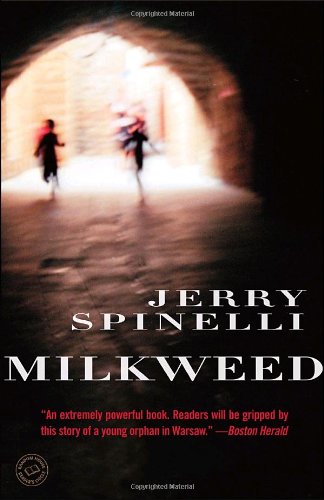All Nonfiction
- Bullying
- Books
- Academic
- Author Interviews
- Celebrity interviews
- College Articles
- College Essays
- Educator of the Year
- Heroes
- Interviews
- Memoir
- Personal Experience
- Sports
- Travel & Culture
All Opinions
- Bullying
- Current Events / Politics
- Discrimination
- Drugs / Alcohol / Smoking
- Entertainment / Celebrities
- Environment
- Love / Relationships
- Movies / Music / TV
- Pop Culture / Trends
- School / College
- Social Issues / Civics
- Spirituality / Religion
- Sports / Hobbies
All Hot Topics
- Bullying
- Community Service
- Environment
- Health
- Letters to the Editor
- Pride & Prejudice
- What Matters
- Back
Summer Guide
- Program Links
- Program Reviews
- Back
College Guide
- College Links
- College Reviews
- College Essays
- College Articles
- Back
Milkweed by Jerry Spinelli
“Stop-thief”, “Misha”, “Gypsy”, “Jew”, “smuggler”- all names that refer to the little boy who survives the Ghetto of Warsaw. Written by Jerry spinelli, Milkweed tells the story of a life lived alone- in the the perspective of a child, Misha, the main character of Milkweed is a brave, curious orphan surviving in the streets of Warsaw at the time of WWII. Misha is the made-up name for a little boy unsure of his identity. Misha has “much less an understanding of the world around him” (spinelli, 23) and only survives by stealing and smuggling. Misha eventually befriends other children who are smugglers. Their ringleader is called Uri. He is an older, protective figure for Misha to look up to and learn from. Within the ghetto, Misha befriends a little girl named Janina; she becomes his best friend- he feels protective over her and helps her and her family survive in the ghetto. Janina’s father: Mr.Shepsel, welcomes Misha and is appreciative of his assistance, unlike Janina’s pessimistic, uncle Shepsel. Misha uses his wit, small size and social connections to survive the harsh environment of the ghetto; Jerry Spinelli uses Misha as the epitome of hope and creative survival- common tactics at the time of the holocaust
The story follows young Misha and his attempt to overcome adversity. He is faced with death, cruelty and judgement- that come in the forms of characters. Such as Hitler, described by Misha as the jackboot who has “half a little black mustache” (Spinelli, 66), and Buffo, the man who suffocates small children in his large belly. Misha’s personal encounters with evil is a common occurrence in Milkweed. Evil, seen through the eyes of a child represents a major theme that accompanies holocaust-related novels and their ability to capture the loss of innocence that takes place in children of that time period. The persecuted children had to mature and develop an intense desensitized personality to endure and survive. Whereas the accusers’ children were faced with the decision to join or not to join the immoral, bandwagon ideals. At a moment of grief, a young thief said in the book: “We don’t exist” (Spinelli, 88). The young thief, as Misha, faced with the unbelievable hardships settled with the idea that questioned their existence. Another major theme is that of hope. The title of the book: Milkweed is a symbol of hope itself. The milkweed plant somehow grows in the ghetto- symbolizing hope of life and perseverance in unpleasant situations.
Personally, I believe Milkweed to be a wonderful book that accurately portrays the difficulty and struggle of a child in the holocaust. Jerry Spinelli’s ability to write, and give perspective to readers facilitates their understanding of the holocaust itself. By understanding and relating to a victim of such injustice, future holocausts can be prevented and coexistence can be promoted. I strongly recommend Milkweed to any reader because of its strong message that is delivered in a well-written, enjoyable fashion.
Throughout the novel, Misha portrays immense strength and courage. He is creative and witty and resilient to the tragedy and loss that occurred during the holocaust. Surviving life in the ghetto, through the eyes of a child, enables readers to feel as Misha felt and understand such an unimaginable historical event. Jerry Spinelli encompasses the true meaning of hope and perseverance through his novel- through Misha.
Similar Articles
JOIN THE DISCUSSION
This article has 0 comments.

